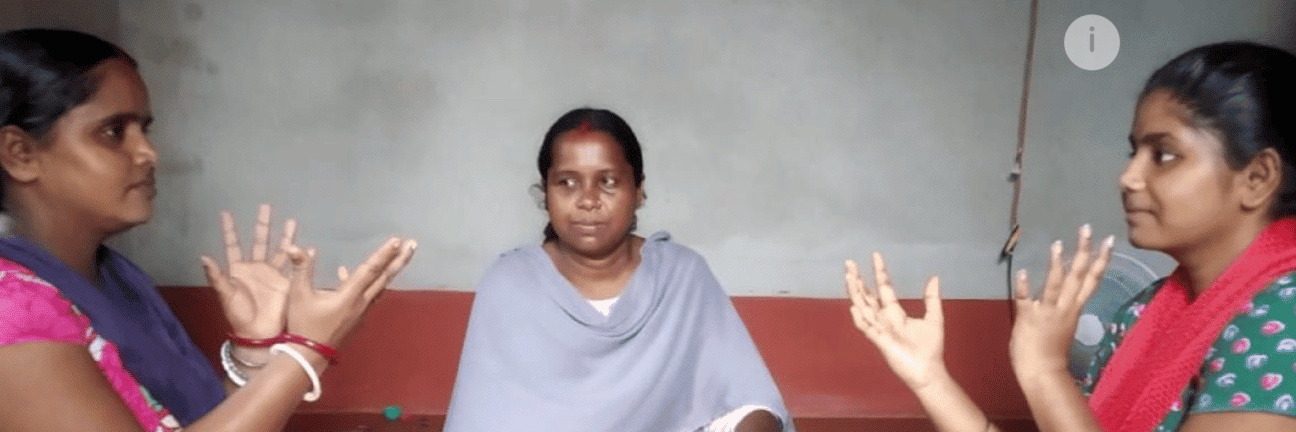Lost after lockdown: What’s the way forward for deaf education in the developing world?
During the twenty years that Deaf Child Worldwide has been working in developing countries, we’ve seen that many deaf children don’t go to school.
Those who do, often drop out early and very few make it to secondary school, let alone further education. Rarely do any of them get a good education.
Deaf education in the developing world has always faced challenges, and these have been exacerbated by the Covid-19 pandemic. But what exactly was the impact of the pandemic on deaf children’s schooling? And what needs to change now to give them the education they deserve?
“A bleak picture”
In February, our Deaf Students Speak Out report shone a light on Covid-19’s effect on the education of deaf children in West Bengal. It painted a bleak picture of a lack of technology, inaccessible learning materials and inadequate support from teachers during the crushing isolation of lockdown.
We were concerned that these experiences were being echoed in other regions and wanted to share our findings with others working in the sector, to see what possible solutions we could all share.
Delegates gather from across the sector
Two years on: the impact of the pandemic on deaf children in the developing world attracted 86 registrants from 13 countries, from education professionals and programme managers to policy specialists and academics. They listened to NGOs from India, Uganda and Zimbabwe, before entering into lively discussions about the way forward.
The webinar examined how deaf children at different ages and stages of life had been affected by lockdowns and school closures during Covid-19. It also looked at the lessons of lockdown and how these learnings might help us devise strategies for improving the education of deaf children going forward.
“Lockdown effectively ended their education”
Three main problems were posed for further discussion: the stagnation of language learning, inaccessible online learning materials and the impact of lockdown on mental health and emotional wellbeing.
The response of governments came under scrutiny for a lack of appropriate support for deaf learners. In India, for example, most government lessons were transmitted during the pandemic via TV, to which very few families had access.
Subscribe to our newsletter
Our weekly email newsletter, Network News, is an indispensable weekly digest of the latest updates on funding, jobs, resources, news and learning opportunities in the international development sector.
Get Network NewsConversely, NGOs were singled out for praise for stepping up and continuing to provide accessible education through their learning centres, including specialist staff to develop teaching materials and help with communication. If it weren’t for these centres, deaf learners would have had little or no educational support for months on end.
The reluctance of many deaf students to return to education once schools reopened was a common theme. As many couldn’t continue their studies at all during lockdown, they lacked both the confidence and the ability to return to an older year group, and their teachers lacked the specific skills necessary to enable them to catch up.
For those students who never returned, lockdown had effectively ended their statutory education.
“It’s vital that we build on these positives”
The delegates also shared examples of positive changes during the pandemic. One NGO in Zimbabwe started giving deaf students written learning materials, which had the added advantage of being shareable with other families, strengthening bonds between them. Through this simple tactic, deaf students could continue their education at home.
Another encouraging effect of lockdown was the closer involvement of families in their deaf child’s education. More home visits by NGOs to provide learning support may have been a factor in this. Many NGOs also reported closer relationships with families as a result.
“A new way of working”
Despite the challenges, there were reasons to be positive – hints at a new way of working as we start to rebuild in the aftermath of the pandemic. It’s vital that we now build on these and come up with new approaches and strategies to address the challenges so starkly exposed by the pandemic.
If we don’t learn the lessons of lockdown and start to build a better future for deaf schoolchildren in the developing world, we risk losing an entire generation of deaf potential.
Category
News & Views
